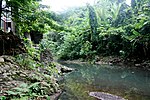Saint Therese of the Child Jesus Parish Church (UPLB)
Churches in the Roman Catholic Diocese of San PabloLos Baños, LagunaRoman Catholic churches in Laguna (province)University of the Philippines Los Baños

The Saint Thérèse of the Child Jesus Parish, is located along Victoria M. Ela St. (formerly Silangan Road, a quick jeepney route via "UP College – Kaliwa") inside the University of the Philippines Los Baños campus and is often referred to as the unofficial UPLB Chapel. It is the first church in the Philippines dedicated to Saint Thérèse of the Child Jesus as its first titular patroness (since 1927) and one of the three Roman catholic churches in the municipality of Los Baños, Laguna, Philippines. The church is designated as the Diocesan Shrine of Saint Thérèse of the Child Jesus of the Roman Catholic Diocese of San Pablo on October 1, 2016.
Excerpt from the Wikipedia article Saint Therese of the Child Jesus Parish Church (UPLB) (License: CC BY-SA 3.0, Authors, Images).Saint Therese of the Child Jesus Parish Church (UPLB)
Victoria M. Ela Avenue,
Geographical coordinates (GPS) Address Nearby Places Show on map
Geographical coordinates (GPS)
| Latitude | Longitude |
|---|---|
| N 14.164722222222 ° | E 121.245 ° |
Address
Victoria M. Ela Avenue 10864-10867
4031
Laguna, Philippines
Open on Google Maps


